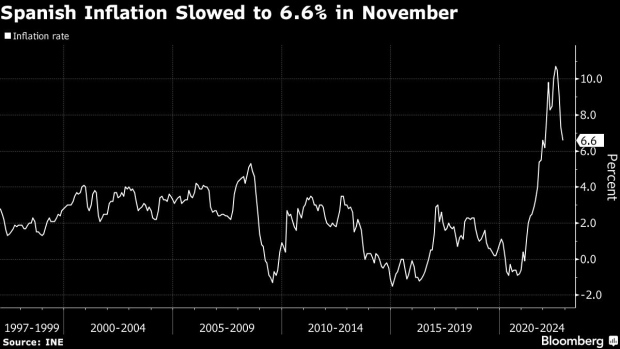Nov 29, 2022
Spanish Inflation Eases More Than Expected in Boost for ECB
, Bloomberg News

(Bloomberg) -- Spanish inflation eased for a fourth month and by more than expected, reinforcing expectations for a wider slowdown in European prices and offering some comfort to the government whose aid measures have brought record budget spending.
Consumer prices advanced by 6.6% from a year ago in November, down from the previous month’s 7.3% advance, the statistics institute said Tuesday. That’s below the 7.1% median estimate in a Bloomberg survey of economists.
The slowdown was driven by declines in electricity and fuel costs and an only moderate rise in clothing. A gauge of underlying prices, however, which excludes volatile items like energy and food, ticked up to 6.3%.
Such measures may take on more significance even as headline inflation rates across the region start to ease, according to Vice President Luis de Guindos.
“The signal we have to keep following is the evolution of underlying inflation,” he told an event in Spain on Tuesday. “This will tell us how inflation can evolve in coming months.”
What Bloomberg Economics Says...
“Today’s reading provides some confirmation that energy pressures have started to ease in parts of the euro area, pointing to a decline in the headline reading.”
--Ana Luis Andrade. For full REACT, click here
Germany, the continent’s biggest economy, will release figures later Tuesday that are expected to show that price gains also eased, while remaining in double digits.
Initial data from North Rhine Westphalia, the country’s most populous state, showed headline inflation slowing. Prices dropped 0.8% on the month -- the first decline since June. Baden Wuerttemberg, Bavaria, Brandenburg and Hesse went the same way.
The euro-zone is seen reporting a slight moderation the following day. The figure will help the European Central Bank decide whether a third straight three-quarter-point hike in interest rates is required to curb unprecedented price pressures in the 19-nation currency bloc.
In Spain, slower inflation will come as a relief for Prime Minister Pedro Sanchez, who’s put in place some of Europe’s strongest tax and energy-price measures, costing more than €35 billion ($36.6 billion), in an effort to ease the cost-of-living crisis.
--With assistance from Joel Rinneby, Ainhoa Goyeneche and Charles Penty.
(Updates with ECB’s Guindos in fifth paragraph, German regional readings in seventh)
©2022 Bloomberg L.P.






